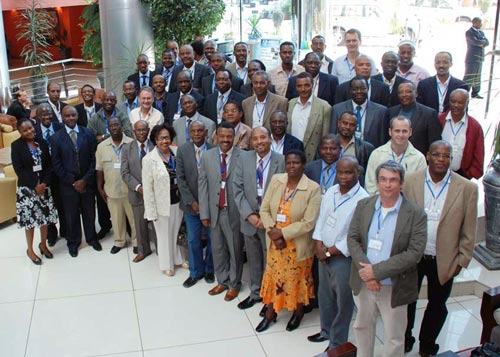 During 26-27 October 2011, seed policy experts met in Addis Ababa, Ethiopia, for a workshop on “Maize seed sector development in eastern and southern Africa”, to chart the way forward for the regions’ seed systems. The workshop was organized by CIMMYT as part of the Drought Tolerant Maize for Africa (DTMA) project, and brought together permanent secretaries of agriculture ministries, members of parliament, seed companies, seed traders associations, heads of research organizations, scientists, and seed regulators from eight of the project countries (Ethiopia, Kenya, Malawi, Mozambique, Uganda, Tanzania, Zambia, and Zimbabwe).
During 26-27 October 2011, seed policy experts met in Addis Ababa, Ethiopia, for a workshop on “Maize seed sector development in eastern and southern Africa”, to chart the way forward for the regions’ seed systems. The workshop was organized by CIMMYT as part of the Drought Tolerant Maize for Africa (DTMA) project, and brought together permanent secretaries of agriculture ministries, members of parliament, seed companies, seed traders associations, heads of research organizations, scientists, and seed regulators from eight of the project countries (Ethiopia, Kenya, Malawi, Mozambique, Uganda, Tanzania, Zambia, and Zimbabwe).
The experts reviewed the results of the 2010/2011 CIMMYT seed sector survey, and assessed the progress made since the last regional policy workshop in 2008, and the survey of 2007/2008. Among the noteworthy achievements was the regional harmonization of seed laws as well as an increasing evidence base to inform policy. Lively discussions focused on five themes: variety development and release; seed production; seed marketing, distribution and storage; farmer adoption and seed use; and seed laws and private sector participation.
To increase effectiveness and productivity of the seed sector, the experts made several policy recommendations:
- International and regional seed laws should be domesticated and harmonized, and embedded within existing legislation.
- To reduce trade in fake seed, competition commissions should be set up and anti-trust laws enacted, including Kenya’s Anti-counterfeit Act, and holograms should be used for seed packaging.
- Smart subsidies with a clear exit strategy, in conjunction with services such as extension education and good agronomy, would be effective in increasing farmers’ access to new drought tolerant maize varieties.
- Seed availability could be increased through irrigated seed production on more land, and credited finance guarantees through national governments.
- The liberalization of seed production, certification, and trade would improve the efficiency of seed sectors and ensure that farmers have access to the best varieties for improved farm incomes and food security.
Summing up the outcomes from the workshop, Hon. John Mututho, Kenyan Member of Parliament and the Chairman of the Parliamentary Agriculture Committee said: “The experts at this meeting have accurately coined the policy issues dealing with seed production, marketing and trade. These policy recommendations should be adopted by the [Kenyan] Executive and Parliament as the basis for developing the Kenyan Seed Act, to be passed in 2012.”

